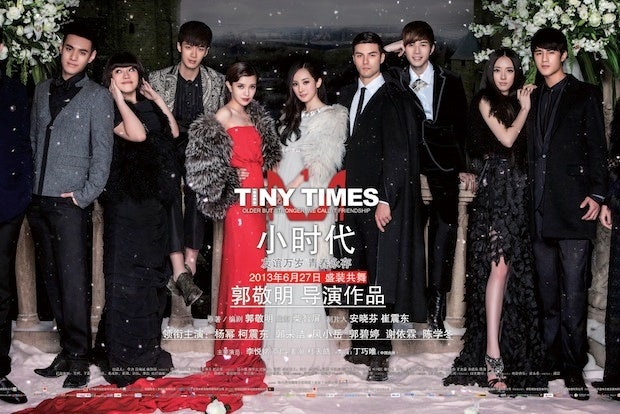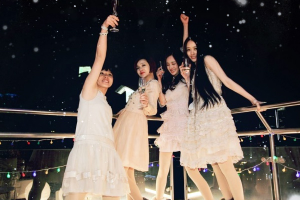
If director Guo Jingming hadn’t just set China’s opening day box office record for a 2-D Chinese-language film with his blockbuster Tiny Times (《小时代》), he may have been more disappointed about the slew of disparaging comments that have been used to describe his luxury goods-saturated work. Just a sampling of these phrases includes “vulgar,” “shallow,” and “hyper-materialist,” as well as full of “twisted male narcissism and a male desire for patriarchal power,” and “unconditional indolence.” What is also striking about the film is its portrayal of what the media is dubbing China’s “me generation”: a new group of rapidly consuming, young, middle-class Chinese, who are statistically more materialistic, according to research by McKinsey.
Luckily for Guo, many of these teens and young adults flocking to the movie couldn’t care less about any of the criticisms lodged against it, and are instead lured into theaters by its attractive stars and glamorous Shanghai setting. The film, based on Guo’s series of young adult books wildly popular with high school girls, is China's answer to Gossip Girl or Twilight, and combines the fabulous lifestyles of the former and the male teen heartthrobs of the latter.

The stars of Tiny Times, including actresses Yang Mi and Amber Kuo, pose with director/author Guo Jingming. (SCMP)
That is not to say that the critiques are not dead-on. The movie’s nonsensical plot has some glaringly regressive gender issues, which have been discussed at length in a perceptive article at ChinaFile by Ying Zhu and Frances Hisgen. For starters, the main character's boss and editor of a major Vogue-esque magazine is inexplicably a straight male surrounded by submissive female assistants, when in reality, all the top fashion editors in China are very powerful women. In addition, the worship of wealth truly is front and center. As Abe Sauer at BrandChannel points out, it is the hero of the film that declares, "Love without materialism is just a pile of sand."
Nonetheless, the success of both the film and the books is clearly a reflection of what younger audiences are willing to plunk down their parents' RMB to see, and thus worth discussing in terms of the cultural norms they espouse. While it is impossible to go so far to say that the film is any kind of accurate reflection of China’s youth culture (although it has sparked a certain amount of "kids these days" conversation), its popularity certainly demonstrates what they want to watch and what factors may be influencing them.
The film's four female protagonists display certain cultural preferences and behaviors that are often radically different from that of an earlier generation in China. Below are some of the most prominent qualities of the main characters, which may give a glimpse of the road to come for China's youth, at least according to one luxury-obsessed director:
They drink.#
In one scene, the main characters get completely sloshed on Champagne on New Year’s Eve—not a remarkable sight for Americans or Europeans, but a highly uncharacteristic activity for Chinese college students, especially women, who positively do not share America’s over-the-top drinking culture. Alcoholic beverage companies are working hard to change this, especially when it comes to Champagne and anything other than red wine, which is the heavily preferred gifting drink of choice among older consumers in China.

Raise your glass to designer brands: a scene from Tiny Times.
“Westernization” persists, but is far from exact imitation.#
In addition to downing Champagne on non-Chinese New Year’s, we also see the characters celebrating Christmas and interspersing their Mandarin with English words every few sentences—but don't think that they’re just trying to copy the West. Christmas, which has appeared in other trendy Chinese rom-coms such as Sophie’s Revenge, is a time for friends, not family (that’s what Spring Festival is for), and many of the ways in which English slang is used are actually incomprehensible to native English speakers. The classic New Year’s song Auld Lang Syne, described as “fashionable,” is a recurring element in the film, but is sung in Mandarin, not English.
Chinese designers are moving into their sphere of influence.#
The film shows a dizzying array of Western brand appearances, including but not limited to "Ferragamo, Chanel, Dolce & Gabbana, Gucci, Prada, Bottega Veneta, Marc Jacobs, Moncler, Armani, Dior, Louis Vuitton, Pelle Moda, Neil Barrett, Birkin, Christian Louboutin, Valentino, BMW, Bentley, Rolls Royce, Texture, Sketch Red, and Apple." The brand sightings have even been counted by fans—Christian Louboutin wins with 21, in case you were wondering. Nonetheless, the movie's climax occurs when the aspiring fashion designer of the group shows off her creations in a runway show to resounding applause and a standing ovation, sending a message that although Chinese fashion is young now, these other brands are going to need to make room for it in the future.
Filial piety is not so important, but devotion to capitalism is.#
The only parental character we see in the movie is its ultimate villain: the elitist, arranged-marriage-partial mother of one character’s boyfriend, who disapproves of the girl’s relatively lower class status. When the son openly talks back to her, it seems like this trope that would have been right at home in earlier PRC propaganda, which favored class struggle over filial piety. However, obedience is still vitally important in the film—at one's job, that is. The main character’s willingness to submit to a range of demeaning and unreasonable tasks demanded by her boss is portrayed as being inherent to a “go-getter” attitude. The storyline is very similar to that of the overworked magazine assistant in The Devil Wears Prada, except this character doesn't quit at the end for a more "fulfilling" job: rather, she earns a free pair of Nikes.
As with any teen movies, the content of Tiny Times is heavily dramatized and voraciously consumed by an impressionable young audience. If you think that this is the last you'll hear of this franchise, think again. Like Twilight, there are multiple books and thus more films to be made. The wait won't be long for its devoted fans, since the next one is due out in August.